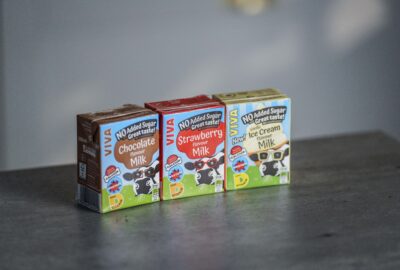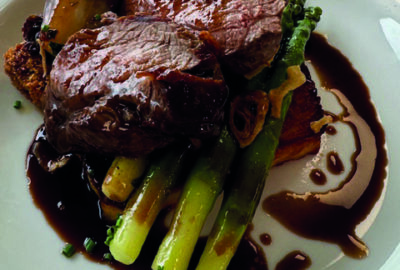Over half a million people participated in Veganuary 2021, an increase of over 180,000 people in 2020 and this year, the numbers are set to rise once again. More than just a movement, Veganuary has been the turning point for many consumers seeking to implement a lifestyle change. Once renowned for boring, tasteless flavours, vegan and plant-based food has undergone a huge transformation, delivering tasty dishes that are not just directed at an ethically minded consumer group.
As we gear up to explore the bounty of new vegan dishes launched this January, we took to the streets to ask chefs, hospitality experts, nutritionists and operators throughout the sector to share their best-selling dishes, advice and plans for Veganuary 2022.
Aneta Jarzmik, General Manager, Hard Rock Cafe Manchester
“Our menu is always evolving and adapting to tastes and trends, one of which is the increased demand for tasty, nutritious, vegan dishes. We’re busy developing some exciting vegan options, but one favourites already on the menu is our Moving Mountains Burger. We call it our ‘100% guilt-free burger’. It has no cholesterol and the wheat, soy and pea protein create a texture similar to a meat burger. The mushroom and coconut oil gives mouthwatering succulence, whilst the beetroot juice makes it look like a real burger when you bite into it. With vegan buns and cheese, it’s perfect for Veganuary.”
Thomas White, Co-Founder, Maray
“In January we will be running our annual Green January offering. Green January is about celebrating our vegetarian and vegan offerings which we are so well known for. Vegetables are a huge part of what we do, they are incredibly versatile and a mainstay of Middle Eastern, North African and Mediterranean cuisine all of which are a huge source of inspiration for our food.
Our Autumn/Winter menu features an abundance of vegan dishes, including confit carrots with a hazelnut butter, tamarind, pickled celeriac and parsley – king oyster mushrooms with cannellini beans, lemon and capers and a comforting braised rice dish with local Ormskirk Kale and chilli oil. These appear alongside our menu favourites which include a vegan rendition of our flagship Disco Cauliflower and sweet potato with tahini and date molasses.
Kaewkraikhot, Owner and Head Chef at Chaophraya
“Our best-selling vegan dish here at Chaophraya is our Pumpkin Thai Red Curry. Made with fresh red chillies, galangal (similar to ginger), cumin, coriander root and lemongrass, this flavoursome curry is the perfect option for those looking for something substantial. This vegetable and protein-rich dish uses Thai pumpkin, which provides a new experience for your taste-buds.
Our customers love how incredibly tasty and creamy this recipe is, despite it being completely plant-based. This dish is garnished with aromatic Thai Basil and pumpkin seeds. With this deliciously comforting recipe, you can expect a sweet and ‘melt in the mouth’ style texture, stemming from cooking over a longer period of time. We’d recommend pairing it with Jasmine rice for a true taste of Thailand.”
Gordon Lauder, MD, Central Foods
“Interest in meat alternatives continues apace, and there’s a growing plethora of options that operators can serve to their customers looking for plant-based meals, but there are big differences in the ingredients used to make vegan and vegetarian meat alternative products and the nutritional benefits that they provide.
The soya used in our recently launched KaterVeg! vegan mince, sausages, burgers and bangers is organic, non-GMO, EU soya grown in existing, established agricultural areas without the use of the controversial herbicide glyphosate, which makes it as good as it gets from both an environmental and a health point of view. The soya is also high in protein, low in fat, low in sugar, a source of fibre and has salt levels below the PHE 2024 targets – all positive attributes which will appeal to customers looking for healthy, sustainable, meat-free menu swaps.”
Alex Hannah, Owner, The Dark Kitchen
“Last year we made a decision to focus our burger offering on a completely plant-based product, launching Bae Burgers using the Beyond meat products and sourcing greens from an urban farm in Liverpool that uses hydroponics in an old warehouse in the city centre. We decided to offer just the Bae Burgers with no meat alternative, to prove just how good the vegan burgers were.
We found this was a great way to get people to try them and have experienced customers re-ordering based on how good they are! To promote them, we used direct quotes from people who couldn’t believe the burgers were all vegan. We even had customers calling the restaurant to double check what was in them as they couldn’t believe the similarities in taste, texture and overall look. They still remain the only burger option on our takeaway menu and are consistently one of the most tagged items on our customer’s social media feeds.”
Daniel Duprat, Foodservice Manager, Bennett Opie Limited
“Menu evolution can be a tricky balance with the spiralling costs that are really hitting the industry – especially if specific ingredients are required – and menu rationalisation is one way of keeping costs under control. Introducing ingredients that can be used creatively across a wide range of dishes and meal occasions that complement both a plant-and-meat-based menu, help ease the ingredient overhead. For example, considering items like compotes that can be used for breakfast with granola or soya milk pancakes and then later in the day for a non-dairy cheesecake topper or fruit crumble. The same applies for olives. A good quality olive can transform a vegan breakfast burrito and be used later in the day for sharing platters – and even for traditional martini cocktails.
It needn’t be daunting; a great place to start is with your best-sellers – adding simple twists to “veganise” your offering. Ambient ingredients really win here as any potential food waste is limited especially as once they are opened, they can often be stored in the refrigerator for a couple of weeks.”


